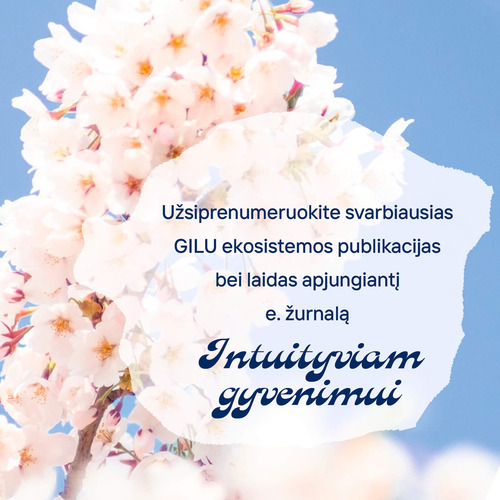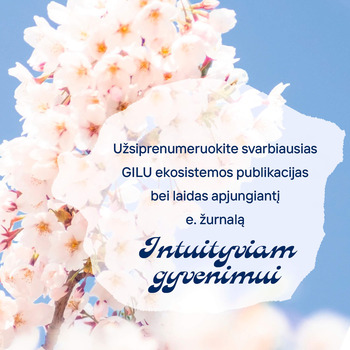Publications
- Home
- Publications
- Philosopher, movement teacher Justas Kučinskas: a business organisation, like the body, is first of all a living system (II)
Philosopher, movement teacher Justas Kučinskas: a business organisation, like the body, is first of all a living system (II)
2023 02 03LRT.lt
"It is easy to forget who you really are, what you believe in, to become overly identified with responsibilities, successes or failures. The ability to return to the body is also a return to yourself, to the layer of being where you are still close to yourself. Returning to the body can give a person a new and adequate view of the surrounding reality", says Justas Kučinskas, philosopher, founder and teacher of the School of Movement.
In the second part of the interview, we talk about the importance of body awareness for leadership and business environment.
- How is body intelligence, inner sense important in a business world that is improving the rationality of excellence?
- I would start with the very obvious answer - health, well-being, liveliness are perhaps the main source of any person's performance. It is not static: everyone experiences phases of elation, tiredness, liveliness, fatigue, health and illness. Sometimes we work well, it's easy to be creative and inventive, to inspire others, and sometimes we don't hold back the bad emotions, everything seems pointless. If only someone could measure how much an organisation's success and failure depends on such fluctuations... How many decisions, meetings, gatherings, have gone one way or another depending on the state of the participants. The question is: are we paying attention, do we have the tools to notice, to correct ourselves, to help others?
Unfortunately, well-being does not depend on a decision to feel good here and now - the body accumulates experiences over time, and many people are in various states against their will. So in this aspect alone, self-awareness - getting to know oneself, listening to oneself, making timely adjustments to behaviour and life rhythms - is perhaps the most important competence for avoiding extreme fluctuations and, ultimately, significant crises.
Another, perhaps less obvious, aspect of body intelligence is non-verbal communication, or, as we like to say, body language. We say a lot with our bodies - actors know this well, but they use their bodies consciously, and many of us are oblivious to what we want to express. The posture, the gait, the gestures of many become ingrained habits, usually never reflected upon. How we present ourselves determines how attractive, approachable, persuasive and credible we are in the eyes of others. Relationships between people start to develop even before the first words are spoken. Let‘s ask ourselves, with what kind of people are we going to enter into a partnership, to build a business - are we going to believe in words alone, or are we also going to rely on what we see and feel?
When we think of a person, there is always a moving image of their body in our imagination. It would be difficult to overestimate the importance of body language. On the other hand, when we feel ourselves, we can better understand others. We can only read and understand their body when we are able to internalise their state of being, their movements, as it were, to replicate them and recognise their origin. Only then can we truly understand what the posture means, not in terms of words but in terms of experience.
It probably goes without saying that one of the most important aspects of managing an organisation, of developing a business, is to understand and choose the right employees and partners, to build sustainable relationships. All this is impossible if we do not understand others and if we express ourselves ambiguously in our own body language. Many young people I know want to study psychology to get to know people better. My advice to them: study movement - your own and others'. If you want to really understand what kind of relationship you have with the person in front of you, where it can develop, play a physical game.
- What can we understand about leadership from body movement?
- When we talk about the importance of inner sense, of body intelligence in business, we also want to come back to the subject of intuition. It seems to me that sooner or later the theme of integrity, of authenticity, becomes important for every leader. Leaders with experience recognise that they reach their greatest capacity, clarity and satisfaction when all aspects of their life, work and personality are in harmony, unidirectional. When an action is taken, a decision is made that is not in conflict with deeper beliefs, that does not create inner conflict. In other words, the vision that is created and realised is consistent with and realises nature. It is the body that plays an important role as a conduit between past and future, experience and creation. It is the repository of experience, a kind of inertia that prevents one from suddenly becoming another and different person.
Most of our actions and reactions are intuitive. First we catch the situation, understand it from the body's perspective - we feel it with every cell of the body, and only then do we rationalise and explain it. Some people are sensitive to the initial reactions, they recognise them, others may not be aware. Whatever the case, this process of intuitive perception and reaction is not going away, so it is important to look for the conditions in which the body becomes a source of freedom, right, integral choice, rather than a source of imprisoning limitations and complexes.
If the body acts as a balanced instrument, it accumulates not only limiting but also opening, empowering experiences, and can become a reliable compass pointing in the direction of the right decisions. Words and concepts can lead to self-deception, the mind can succumb to all sorts of sophistic temptations, but the body does not usually lie.
The body informs us when we make the wrong choices: physically we experience depression, remorse, heartache. The body's sensations, if we listen to them, tell us whether a short-term decision is integral to a long accumulated life experience. Once again, working with the body is not, and should not be, just about training it - it is about sharpening and purifying the most intelligent cognitive instrument that nature has created.
After all, in everyday life, especially in business, people play different roles. It is easy to forget who you really are, what you believe in, to over-identify with responsibilities, successes or failures. The ability to return to the body is also a return to the self, to a layer of being where you are still close to yourself. Such a return can give a person a new and adequate view of the reality around him.
- Today, there is still an instrumental, consumerist view of the body as a machine that should serve as smoothly as possible, preferably with as little maintenance as possible. This is contrary to the principles of living systems (which include the body) that processes are cyclical, that it is impossible to function without pauses, accumulation phases, etc. What do you think is most helpful in opening up to such an approach?
- To put it simply, the way we treat ourselves is the way we treat our environment. Conversely, it is also through our relationship with the world that we form our attitude towards ourselves. The body, unfortunately, is very often perceived in an instrumental, mechanical way, even if it is not thought about specifically. This attitude is manifested in the training of individual parameters - strength, speed, flexibility - or in the development and treatment of individual parts of the body, in the one-sided demand for certain qualities and results, without taking into account the specific context and the needs of the body. One's own body is more often seen as an external object that has to meet quantitative, medical or aesthetic criteria, rather than seeking first-hand experience. Appearances become more important than actually being. Cognition is informed by fragmentary quantitative research rather than the immediate qualitative experience of the whole.
Through the practice of movement and the study of philosophy, I have been able to see and understand the body in a different way - as a living organism, a system, or even, in the words of my teacher Arvydas Šliogeris, a substantial individual. This change of perspective changes everything - how we understand reality determines how we deal with it. Any mechanism is cognitive, usually predictable, and therefore it is preferable to apply protocols, standards and strict definitions in our relationship with it. Parts of a mechanism wear out and can be replaced.
The mechanism is the same in the laboratory as in any other environment. But with a living organism it is different: every living system is complex and contextual - it cannot be understood in isolation from its context, or explained uniquely in terms of its parts and their functional / causal interactions. Therefore, leading a mechanism or leading a living system are two different things.
When I say to guide or to lead, I am consciously making a distinction - they are two different ways of interacting. Every living organism has an impulse to grow, to evolve, so the main task is to listen to the specific context and to allow the organism to flourish. In the ever-changing context of the organism, we cannot have all the answers, educational and therapeutic protocols prepared, defined and standardised in advance, but we must respond sensitively so that it can flourish in the best possible way under the conditions. In this case, it is important not to develop individual characteristics, but overall resilience and adaptability - to create a variety of situations that activate immunity and broaden the range of solutions. Communication, connectedness, coordination, rhythm become the key words here - they call for the development of the organism as a whole, inseparable from the environment - the specific challenges.
- So, is the organisation a mechanism or a living system? What are the qualities needed to lead an organisation?
- It seems to me that when we look at living systems, the principles of life, we can see many parallels. I think there are limits to strict hierarchy, standardisation of processes, detailing five-year strategies, growth based on aggressive marketing rather than organic development of ideas and products, and continuous efficiency. This works as long as the environment is predictable and the organisation is simple. But most of the time the business environment is too fluid and complex, the people working in organisations are too alive and too fallible to apply the most appropriate protocol for managing and developing the organisation.
In an uncertain environment, in a changing environment of internal relations and competences, the ability to constantly adapt, to reorganise - to find new ways of coordination, to change the rhythm, to reconnect - becomes perhaps the most important characteristic of an organisation. However, as organisations grow, this cannot be done not only by the leader but also by the management team. Adaptability requires at least some decentralisation of decision-making, and only a culture that fosters good communication habits can ensure sustainability.
It seems that we can expect from an organisation what we expect from other living systems: an improvement in self-organisation skills, leading to an ever-increasing capacity to adapt in an increasingly complex environment. Peter Senge, one of the first to see the link between living systems and organisations, called such organisations "learning organisations".
The mechanistic worldview is deeply ingrained in our habits, especially in social structures, but I think that attentiveness to the body can open up not only a theoretically different view of organisations, but also create different precedents for practical contact. I repeat: how we encounter ourselves ultimately determines the kind of relationships we build in the world.











